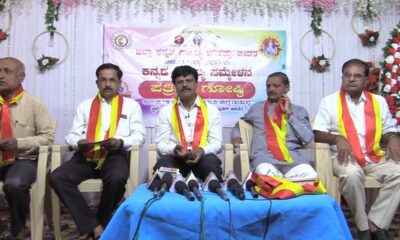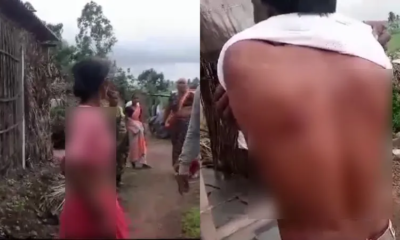Karnataka
Karnataka Bandh on March 22: Key Details on What’s Open and Closed in Bengaluru
Bengaluru is set to experience a Karnataka Bandh on March 22, impacting daily life across the city. The statewide shutdown has been called by various organizations in protest against certain governmental policies and regional issues. Citizens are advised to stay informed about which services will remain operational and which will be affected. Why is Karnataka […]

Bengaluru is set to experience a Karnataka Bandh on March 22, impacting daily life across the city. The statewide shutdown has been called by various organizations in protest against certain governmental policies and regional issues. Citizens are advised to stay informed about which services will remain operational and which will be affected.
Why is Karnataka Bandh Happening?
The bandh has been organized by several pro-Kannada groups, labor unions, and political organizations. Their primary concerns include state-related demands, governance policies, and regional issues affecting Karnataka. The protest is expected to see widespread participation, leading to potential disruptions.
What Will Be Open?
Essential services such as hospitals, pharmacies, ambulances, and emergency healthcare facilities will remain fully functional.
Airports, railway stations, and bus terminals are expected to operate normally, though some delays might occur.
Banks and ATMs are likely to remain open.
What Will Be Closed?
Public transport services such as BMTC and KSRTC buses may be disrupted due to protester participation.
Schools and colleges could remain shut in parts of Bengaluru, depending on local authorities’ decisions.
Shops, markets, and commercial establishments in affected areas may close as a precautionary measure.
Traffic and Security Arrangements
Bengaluru police have increased security measures across the city, deploying additional personnel to prevent any untoward incidents. Citizens are advised to avoid non-essential travel and stay updated on real-time developments.
How Will This Affect Daily Life?
The bandh on March 22 could lead to traffic congestion, delays in transportation, and business closures in some areas. Commuters should check for alternative routes and stay informed about official updates from authorities.
Karnataka
Karnataka BJP Kicks Off Overnight Protest Against Price Hikes and Muslim Quota
Led by BJP’s state president Vijayendra, the demonstration targets the Congress-led government’s recent price hikes and its controversial decision to introduce a 4% reservation for Muslims […]

Bengaluru, Karnataka: The political air in Karnataka is buzzing as the Bharatiya Janata Party (BJP) launched an overnight protest at Freedom Park in Bengaluru on Wednesday, April 2, 2025. Led by state president BY Vijayendra, the demonstration targets the Congress-led government’s recent price hikes and its controversial decision to introduce a 4% reservation for Muslims in government contracts. With emotions running high, this protest marks a bold stand against what the BJP calls a “burden on the people.”
The protest kicked off at 11 a.m. and stretched into the night, with Vijayendra slamming the Siddaramaiah government for making life tougher for everyday citizens. He pointed to the recent Rs 4 increase in Nandini milk prices—now the third hike since Congress took charge—as an “Ugadi gift” that’s left families struggling. “This government promised relief but delivered only rising costs,” Vijayendra said, vowing to keep the pressure on until the hikes are rolled back.
A Fight Against Rising Costs and Policy Shifts
The BJP isn’t stopping at milk prices. Vijayendra accused the government of jacking up water tariffs, petrol costs, and more, hitting the poor and farmers the hardest. He also took aim at the 4% quota for Muslims in public contracts, labeling it “unconstitutional” and a move that sidelines other backward classes like SCs, STs, and OBCs. “This isn’t about fairness—it’s about appeasement politics,” he argued, promising a statewide awareness campaign starting April 10 to rally public support.
The protest saw a strong turnout, with BJP MLAs, MLCs, former legislators, and district leaders joining in. Vijayendra stressed that this is just the beginning, with plans for demonstrations across all district centers on April 4 and taluk-level protests on April 5. “We’re here to fight for the people, not just make noise,” he added, urging the government to rethink its policies.
A Divided Response
While the BJP rallies its base, the Congress government defends its actions. The milk price hike, they say, supports dairy farmers by covering rising production costs, with Karnataka Milk Federation (KMF) Chairman Bheema Naik noting that prices here are still lower than in states like Gujarat or Delhi. On the Muslim quota, the government insists it’s based on socio-economic backwardness, not religion, aligning with long-standing policies under previous administrations.
Yet, the BJP remains unconvinced, accusing Congress of playing the minority card to win votes. The tension spilled into the streets of Bengaluru, with protesters chanting slogans and holding signs, creating a lively yet tense atmosphere. Police kept a close watch, ensuring the demonstration stayed peaceful as traffic flowed nearby and shops stayed open.
What’s Next for Karnataka?
This overnight protest is more than a one-night stand—it’s a signal of bigger battles ahead. With the BJP gearing up for a statewide movement, and the Congress digging in, Karnataka’s political scene is heating up. Residents are left wondering: Will the government back down, or will this spark a longer fight? For now, the focus is on Freedom Park, where voices of dissent echo into the early morning.
Stay tuned as this story develops. Whether it’s about your grocery bill or community rights, this protest could shape Karnataka’s future. Keep checking for the latest updates on price hikes, Muslim quota debates, and more!
Karnataka
VHP Appeals to Karnataka Governor to Reject Bill Granting 4% Quota for Muslims
Debate Intensifies Over Religion-Based Reservations in Karnataka’s Public Contracts The Vishwa Hindu Parishad (VHP) has formally requested Karnataka Governor Thaawarchand Gehlot to withhold approval of the recently passed Karnataka Transparency in Public Procurements (Amendment) Bill, 2025. This legislation aims to reserve 4% of public contracts for Muslim contractors, specifically allocating quotas for civil works up […]

Debate Intensifies Over Religion-Based Reservations in Karnataka’s Public Contracts
The Vishwa Hindu Parishad (VHP) has formally requested Karnataka Governor Thaawarchand Gehlot to withhold approval of the recently passed Karnataka Transparency in Public Procurement (Amendment) Bill, 2025. This legislation aims to reserve 4% of public contracts for Muslim contractors, specifically allocating quotas for civil works up to ₹2 crore and goods and services contracts up to ₹1 crore.
In their memorandum, the VHP contends that the bill contravenes constitutional principles by introducing reservations based on religion. They highlight that Dr. B.R. Ambedkar, the chief architect of the Indian Constitution, opposed religion-based reservations, emphasizing that Article 15 prohibits the state from discriminating among citizens on grounds of religion or caste.
The organization further references previous judicial decisions where courts, including the Supreme Court, have invalidated similar attempts at religion-based reservations in other states. They argue that implementing such quotas poses a threat to national integrity, unity, and sovereignty, accusing the Karnataka government of engaging in vote-bank politics.
This development follows the passage of the bill in the Karnataka Legislative Assembly amid significant opposition and controversy. The Bharatiya Janata Party (BJP) has also voiced strong objections, labeling the move as unconstitutional and vowing to challenge it legally.
Karnataka
Shocking Karnataka Honey Trap Scandal: Supreme Court Rejects CBI Probe Plea
Political Drama Unfolds as KN Rajanna’s Claims Stir Controversy

Political Drama on Honey Trap Unfolds as KN Rajanna’s Claims Stir Controversy
In a dramatic turn of events, the Supreme Court shut down a bold request for a CBI or SIT investigation into Karnataka’s alleged honey trap saga on March 26, 2025, leaving political circles buzzing and everyday folks scratching their heads.
The public interest litigation (PIL), filed by Jharkhand resident Binay Kumar Singh, aimed to dig deeper into explosive claims made by Karnataka Cooperation Minister KN Rajanna. He’d alleged that 48 politicians—including big names from both state and national levels—had been ensnared in a web of scandal involving compromising videos. But the court wasn’t having it, dismissing the plea as “political nonsense” and questioning why it even landed on their desk.
The whole mess kicked off when Rajanna dropped his bombshell on the floor of the Karnataka Assembly, hinting at a sprawling honey trap network that didn’t care about party lines—Congress, BJP, you name it.
Singh’s PIL painted a dire picture, suggesting this wasn’t just gossip but a serious threat to justice, especially with whispers that judges might be tangled up too. He begged for an independent probe, free from Karnataka’s influence, overseen by either the Supreme Court or a retired judge. Yet, the bench—led by Justices Vikram Nath, Sanjay Karol, and Sandeep Mehta—brushed it off, saying, “We’ve got bigger fish to fry.”
Rajanna himself tried to clear the air, insisting he never pointed fingers at judges. “It’s all about political rivals slinging mud—nothing more,” he told reporters, hinting the PIL twisted his words for drama. Meanwhile, Karnataka’s Home Minister G Parameshwara didn’t sit idle. After Rajanna handed over a three-page complaint about his own honey trap close call, Parameshwara promised a high-level state investigation. “This isn’t just about one guy—it’s about dignity for all of us in the Assembly,” he said, vowing to get to the bottom of it.
The opposition BJP wasn’t about to let this slide either. They turned the Assembly into a shouting match, waving CDs and demanding a judicial probe, only to see 18 of their MLAs suspended for six months after the chaos. Former CM Basavaraj Bommai didn’t mince words, slamming the state’s “criminal cabinet” and saying Karnataka’s reputation is taking a beating nationwide.
For regular folks watching from the sidelines, it’s a mix of shock and skepticism. “Politicians caught in scandals? Sounds like a Tuesday,” one Bengaluru resident quipped. Others wonder if the truth will ever come out without a neutral agency like the CBI stepping in. With the Supreme Court washing its hands of the matter, all eyes are on Karnataka’s next move. Will Parameshwara’s probe deliver answers, or is this just another chapter in the state’s wild political soap opera? Stay tuned—this one’s far from over. What do you think—conspiracy or just dirty politics? Let us know!
-

 india2 years ago
india2 years ago“Major Crash of Sukhoi Su-30 and Mirage 2000 Fighter Jets in Madhya Pradesh”
-

 Sports2 years ago
Sports2 years agoWFI meetings on April 16, elections likely to be discussed
-

 india1 year ago
india1 year agoPM Modi Meets Deve Gowda for Seat Sharing Talks
-

 india1 year ago
india1 year agoBengaluru: False threat to bomb Raj Bhavan
-

 india2 years ago
india2 years ago“AIMIM to Contest 50 Seats in Upcoming Telangana Assembly Elections”
-

 Entertainment1 year ago
Entertainment1 year agoAnant Ambani: Controversy at the Ambani Pre-Wedding Bash
-

 Entertainment2 years ago
Entertainment2 years agoRajinikanth is Moideen Bhai in ‘Lal Salaam’
-

 Videos2 years ago
Videos2 years agoBidar News : Press Meet Organized By Zilla Kannada Sahitya Parishad














